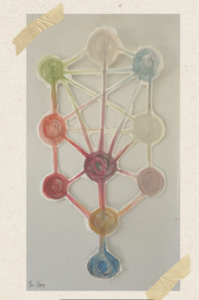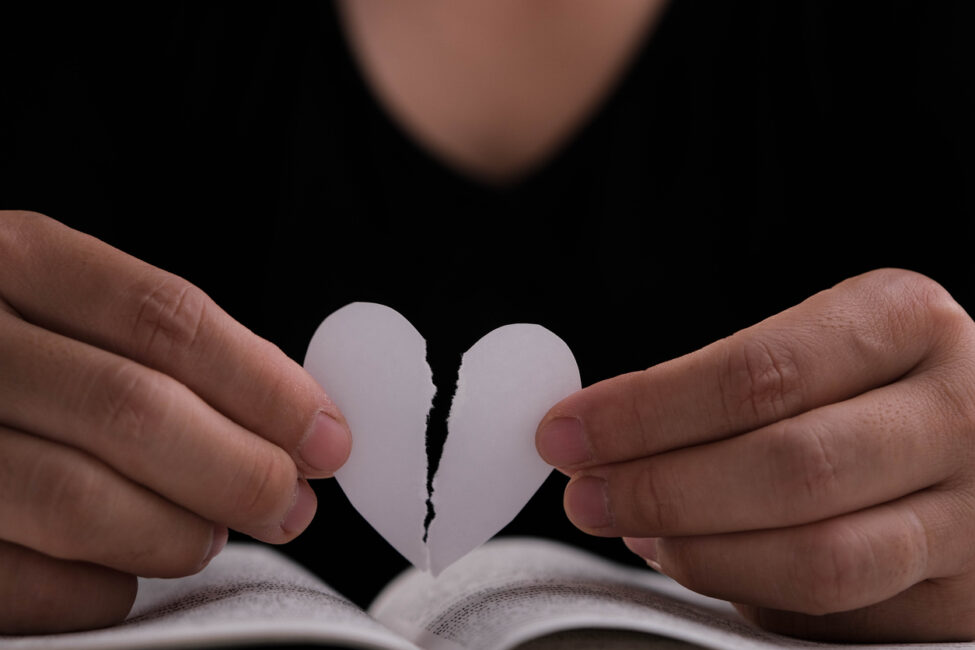After a three-year relationship, Gray (they/them) and Lexi (they/she) broke up. The two desperately wanted to stay friends, but they both kept falling back into old patterns and getting back together. They tried to take space from each other but found it nearly impossible because Gray and Lexi were always in the same spaces anyway: they share a dog, they go to the same Jewish community events, and they have lived in the same neighborhood for many years. Now, they are trying to accept the reality that their relationship cannot continue like this. Something needs to end.
While this vignette is fictional, it is based on very real and raw stories that the two of us have witnessed and experienced many times over. Molly has moved through a number of relationship shifts in the past couple of years. Sai has felt the pain of breakups long after they ended; sometimes it felt like it was too long.
According to some studies, breakups can cause neurochemical withdrawals. Your brain expects the chemical fulfillment that it gets from giving and receiving love from someone. Without it, your brain can go through withdrawal–your mind unravels, your body hurts, your heart aches, and your spirit dims.
Whether it was a long-term romantic partnership, platonic friendship, family connection, or even someone we dated just a few times, there are so many varieties of relationship endings and so few ways to process them with supportive community.
This is especially true for relationships that aren’t considered normative or “significant” enough. Breakup support writ large often centers long-term, heterosexual, monogamous breakups or divorce. But those who are LGBTQIA+, non-monogamous, or in short-term or non-traditional relationships have particular needs during and after breakups, including spiritual needs.
While there are many tools in Jewish tradition for marking moments of celebration or mourning, few, if any, address relationship endings. That’s why we created Sof: A Jewish Mystical Guide Through Relationship Endings, a 10-week ritual guide that offers spiritual support for people going through a variety of breakups.
The name for our guide is Sof, meaning “ending” in Hebrew. This title is a play on the name of the Kabbalistic infinite realm of the Divine that lives beyond the realm of human consciousness: Ain Sof–without end. As students in the same year at the Reconstructionist Rabbinical College, we were inspired by Kabbalah (Jewish mysticism). Our teacher, Rabbi Vivie Mayer, helped us to understand how our world is connected to that place of Ain Sof. Each Sephirah has a quality that could lead us to deeper understand ourselves, the world, the Divine, and the interconnectedness of all things.
 “Etz Hayim” by Sai Koros
“Etz Hayim” by Sai Koros
Inspired by this Kabbalistic framework, we began developing ten unique rituals to both teach about Kabbalah and also accompany people through their breakup processes. From an adapted havdalah ritual, altar-making, mikveh, and more, we reimagined existing Jewish rituals to accompany people through the long period of transitions out of relationships. Each of the ten rituals has its own set of “ritual ingredients” and draws on the idea of a magic spell to enact change. The rituals weave Hebrew and English and are designed to be adaptable to meet people’s needs.
With support from the Auerbach Ignition Grant, we launched a pilot of Sof to explore the best way to implement the guide. Though we expected only 5-8 people to be interested, over 30 people responded to our call for participants.
We realized that this was an unmet need.
Since then, we’ve drastically expanded our project to pilot different varieties of engagement, including whether participants receive the guide weekly or all at once—whether they experience the guide alone, in guided small groups, or one-on-one with one of us. We’ve been incredibly grateful for the vulnerability that our participants have brought to this project. Now, five weeks into the program, we’ve learned a great deal. For example, when the breakup is more recent, it takes longer to sit with each ritual before moving to the next one. We’ve also seen that when people move through the guide with a small group, they are more likely to show up for scheduled meetings and provide feedback on each ritual. Some people would like to share the guide with their ex, prompting us to wonder what structures of support could look like for two people moving through the guide simultaneously. The Jewish mystical learning is appealing to only some participants; others want access to more music and somatic practices. There was interest in local in-person meetings with others in their city who are also moving through the guide. We’ll incorporate these insights into our next iteration of Sof. We are only halfway through our pilot, but we are already thinking about the next iteration of offerings. How will we scale this project? What will make it a viable business model in the future? How often will we run programming around it?
What is clear is that we’ve struck a chord, and we are so grateful for the outpouring of support we’ve received from our participants and community. All in all, we’ve been blessed to receive all our participants’ care, feedback, and resilience through this process.
We’d like to end with a blessing from the guide, adapted from a Havdalah ritual in Sof:


